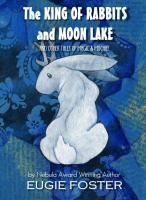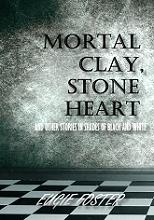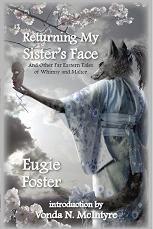The anthology The Dragon and the Stars is a finalist this year for an Aurora (Canada’s highest science fiction award) in the category of Best English Related Work, so I’m swiping a page from Eric Choi and Derwin Mak’s playbook and publishing an excerpt of my story, “Mortal Clay, Stone Heart,” for folks to consider when they’re casting their votes:
Mortal Clay, Stone Heart (excerpt)
“Ai-yah, Shu-mei!”
I started, nearly dropping the unfinished earthenware bowl. Baba has said—sometimes exasperated, sometimes amused—that the element that governs my spirit is not metal or fire, wood or water, but clay. And I suppose it’s true. As far back as I can remember, I’ve had an affinity for finding the hidden grace inside pliant earth, the hard strength and flowing forms that the industry of my hands and the fire of the kiln can set free. But this affinity frequently makes me unmindful of such things as the passage of time and Baba’s homecoming.
“Clay on your face, and is that slurry on your sleeve?” My father continued to scold me as I fumbled the bowl aside. “Do you think you could manage not to disgrace me with a grimy-faced welcome for the visitor I’m expecting tomorrow? The daughter of the Emperor’s Overseer of Terracotta Sentinels should be refined and decorous.”
“Hmpf. Do the terracotta soldiers concern themselves with the impression they make upon me?”
“Shu-mei, you’re no longer a child. Have you considered how other girls your age are already married, even mothers?”
I pretended to scrutinize the bowl, hoping that Baba wouldn’t notice the heat suffusing my cheeks. I couldn’t tell him my heart already belonged to another. Although I didn’t delude myself that the man I admired regarded me with the slightest measure of consideration I held for him, it was too embarrassing and absurd to admit my one-sided love to anyone.
“What do I need a husband for?” I mumbled. “Kong Fuzi says that contentment can be found ‘with coarse rice to eat, water to drink, and—'”
“Be silent!”
I couldn’t have been more astonished if Baba had spouted hooves and bleated like a goat. “The mouth is the gateway to misfortune” was how other fathers instructed their daughters. But Baba had dismissed my nurse when I was four when she’d scolded me for demanding to be taught the abacus. He’d taught me himself how to do sums and read, and the arts of philosophy and debate.
Baba relented. “Forgive me. You couldn’t have known. The Emperor has prohibited any discourse regarding the Hundred Schools of Thought.”
“What?” Relief that my father was not, after all, transforming into a goat vied with shock.
“The only principles one may extol are those prescribed by the School of Law.”
“That’s ridiculous. How can any man prohibit another from thoughtful contemplation?”
“Qin Shi Huangdi is not a man. He is the Emperor. And he has decreed that all the histories and analects in opposition to the School of Law be consigned to fire.”
The treasury of bamboo slip scrolls in my studio hung before my mind’s eye. “But how can the empire move forward if it cannot study the past?”
Baba fixed me with a hard stare. “Shu-mei, I am in the habit of indulging your stubbornness, but you must understand the position I am in as one of the Emperor’s officials. There can be no hint of sedition from this house.”
I’d never seen my father look so grim. “I understand.”
In the morning, Old Baishi, Baba’s retainer, loaded our library into the firebox of the little dragon kiln built into the natural hillside at garden’s edge. Bleak and disconsolate, I turned to clay for commiseration, and it obliged me with a yellow Qilin. Adorned with the antlers of a deer, the hooves of an ox, and the tail of a lion, Qilin are the celestial emblem designating the element of earth, the natural foil to water—absorbing it. And water was the element and symbol of Qin Shi Huangdi.
As seditious acts went, it was admittedly a feeble one. But it helped, venting my outrage in this manner until late into the night.
I woke the next day to the afternoon sun chiding my eyes, with barely enough time to make myself presentable for Baba’s guest. I donned a malachite coat and an ebony skirt that swirled like the sea, all the while wishing for a comfortable shenyi and the company of clay. As I finished securing the jade-green sash, I heard the hi-hiin whinny of a horse.
I hurried out, rehearsing appropriate phrases of welcome. But at the entrance, all words deserted me. It was not Baba with some stuffy official but the crown prince of the empire, Prince Fusu, handing the reins of his mount to Baishi.
Although I stood mute and stock-still, he noticed me and bowed. “No one could mistake you for anything but a refined and well-born lady today, Shu-mei.”
I was goggling like a fish, but I couldn’t look away. Memories of our previous meeting transfixed me, juxtaposing with this moment: Prince Fusu before me now and Prince Fusu from that other afternoon, drenched and seeking refuge from a sudden downpour.
He’d thought me a servant—my hair in rags, my shenyi splattered by clay. His first words to me, by way of introduction, were, “You, girl, could you fetch your mistress and bring me a towel? I’m near to drowning on your doorstep.”
I bowed to conceal my embarrassment and irritation. “I’m Shu-mei. My father, the Imperial Overseer of Terracotta Sentinels, does not keep household servants. I’m afraid there’s only myself—that is, unless you’d prefer our gardener, old Baishi, to attend you?”
“That won’t be necessary,” he replied, curt and dismissive. He stepped past me, and I shut the door to the rain, wondering whether I’d invited the more turbulent storm inside.
I fetched one of Baba’s housecoats to replace his sopping garments and put a pot of water on to heat, aware of his eyes following me.
“You’re not at all as I imagined,” he said at last. “I thought the girl who fashioned that exquisite terracotta rabbit in your father’s studio and who puts his apprentices to shame with her unflagging diligence would be as stout and formidable as he. But instead I find a willowy girl with rosy cheeks.”
My cheeks, however rosy they’d been, blazed.
An eyebrow quirked. “Modest too? Unpretentious, modest, and undoubtedly steadfast. If you’re a fraction as diligent as your father claims, you epitomize Kong Fuzi’s ideal of virtue.”
“You’re a follower of Kong Fuzi’s teachings?” I all but lunged at the opening, anything to shift the conversation from my rosy cheeks, the merits of my character, or even the terracotta rabbit. I’d fashioned that piece after my mother died—she’d been born in the year of the rabbit—and it was not a subject I cared to discuss with this man.
“Any school that proclaims real knowledge to be in grasping the extent of one’s ignorance can be assured of my devotion.” Prince Fusu winked, startling a smile from me. His return smile transformed him, making him younger, warmer. Our eyes met, and something within me shifted, realigned. Shaken and off balance, I understood later it had been nothing more or less than the foundation of my world giving way to be replaced by a new one: Prince Fusu.
“Shu-mei?” The prince’s voice shook away my paralysis.
I bowed, mortified I’d kept him waiting like a peddler at the door. “Please be welcome. My father isn’t home yet, but I expect him soon.”
“Until he arrives, could I impose upon you for a tour of your kiln? The rain precluded my curiosity last time.”
“Of course.” I joined him on the stone walkway, striving to appear composed despite the agitated tremors that shook through me. But at the garden gate, I frowned. “Oh, wait, what if Baba’s stuffy official finally arrives?” I clapped both hands over my mouth, appalled. How had I let myself say that aloud?
The prince chuckled. “I wondered if I’d misremembered the girl who glared at me so fiercely when I mistook her for a servant. But at last, here she is. As to the matter of the stuffy official, I suspect I am he.”
I smiled shyly back, relieved. “Your highness could never be stuffy.”
“And why not? I’ve had the finest teachers to instruct me on all the varied forms and methods of stuffiness. I assure you, I’m a master at it.”
I bit back a giggle and opened the gate.
“I’ve been unforgivably remiss in not thanking you for your gift before now,” Fusu said, “but I hoped to be able to convey my appreciation in person.”
I lowered my eyes. I’d fashioned the marbled tiger from two different clays to create a pattern that was both impetuous and considered—like the man strolling beside me.
“I showed my father your tiger,” he continued, “and he wishes you to sculpt a matched team of terracotta horses for his afterlife city.” The prince drew a sandstone token stamped with the imperial sigil from a pouch and offered it to me. “How convenient of my father to provide an official reason to call upon you.”
I only partly heard him, my attention riveted on the imperial token. “The Emperor wants me to sculpt his horses?”
“He desires that his spirit world be as lively as this earthly one.”
I glanced up at the tautness in the prince’s voice, reminded of the whispered speculations that had arisen when Qin Shi Huangdi had first conceived his afterlife city, revealing his disquieting obsession with the trappings of immortality. Fusu would never undermine the Emperor, but his tone told me how troubled he was by his father’s recent directives. The prince believed as I did in Kong Fuzi’s teachings, as Baba had taught me: Ignorance is the night of the mind. How much more had it sickened him, the mandated destruction of wisdom?
I accepted the token. “My efforts will no doubt be inadequate, but I will do my best.”
“I await with great anticipation your forthcoming masterpieces, Sifu.”
No one had addressed me as a master artisan before. Did modesty require me to protest such honor or would that cause the prince to lose face? Before I could make up my mind, he swiveled, head raised.
“What’s that?”
I strained, listening.
Rumbling, a subtle crescendo in the distance. An approaching thunderstorm perhaps?
“Men marching,” Fusu said. “A brigade’s worth, but not soldiers.”
“Not soldiers?”
“The tread of an army is a tide that swells in a measured, beating gait.” Fusu’s eyes no longer saw me, focused upon some inner reflection. “This is undisciplined and irregular.”
“A parade then?” I suggested.
“Shall we go see?” He pivoted and strode to where Baishi had tethered his horse, leaving me to scramble after. He flipped the reins free and mounted while I struggled not to trip over my skirt. He leaned to me, hand outstretched.
Should I have hesitated, refined and decorous like a court lady? I didn’t. I gripped his hand, and he swung me up behind him.
My riding acquaintance was limited to infrequent occasions atop draft horses and once, an indulgent cow. I teetered, feeling as graceful and secure as a sack of rice on a bamboo fence.
“Don’t be afraid. Hold onto me if you’re unsteady.”
“I’m not afraid.” I hoped I sounded bolder than I felt. “But I admit to a certain unsteadiness.”
“Fei-hua is as courteous as she is swift. Neither of us will let you fall.”
I remained dubious, but contrary to my expectations, when Fei-hua sprang forward, I didn’t topple off, a feat I credited to luck, as it certainly could not have been skill. I did, however, clutch at Fusu like a drowning woman, kicking Fei-hua with my heels in the process. Fortunately, her disposition was as gracious as the prince had said, and she didn’t take offense.
I eased my grip, and, as though he’d been waiting for this, Fusu leaned forward, bringing us low across Fei-hua’s back. She, in turn, transformed from an earthbound creature to one of wind, anchored to this world only by the prince’s will. To call both Fei-hua and the drays I’d sat before “horses” was like calling a blue-glazed platter the sky. And what I’d taken as a gallop had actually been for her an easy canter.
I laughed in fierce exhilaration, intoxicated by the heady combination of Fei-hua’s speed, the heat of Fusu against me, and the thrill of basking in both. The prince turned his head, beaming like a boy.
All too soon, we slowed. I brushed streamers of hair from my eyes and saw why. A procession of hundreds of men marched on the imperial highway; scholars all, their vocation apparent from their somber robes.
Prince Fusu slipped from Fei-hua’s back and handed me the reins. “Wait here.”
I didn’t know if he’d addressed me or Fei-hua, but fortunately the mare considered it one and the same. I had no notion what to do with the straps of leather he’d given me, and doubted I could’ve dissuaded her if she’d had other designs.
Where had the prince gone? I scanned the highway until I spotted him engaged in discussion, not with a scholar, but with a soldier. Before I had time to speculate about their conversation, Fusu came pelting back.
“I regret that our visit must be curtailed,” he said, hurling himself into the saddle. He waited only for me to grasp his waist before spurring Fei-hua into a breath-stealing run.
“What’s going on?” I had to yell to be heard above the strident wind.
“The Emperor has ordered the execution of those scholars for adhering to Kong Fuzi’s teachings.”
Read the rest in The Dragon and the Stars, edited by Derwin Mak and Eric Choi, DAW Books, ISBN 978-0-7564-0618-9, 2010.










I have that book. It’s a good one.